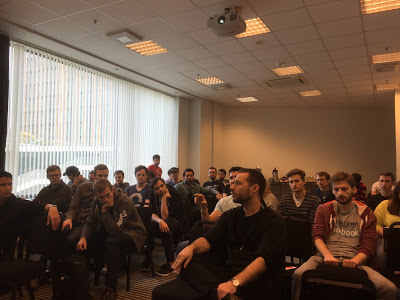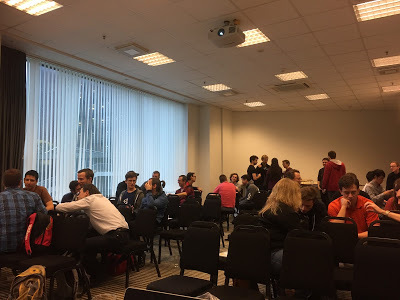What I learned from giving my first ever workshop
Earlier this week I was a co-presenter for a 2 day workshop on SBTM (Session Based Test Management), at Unity.
SBTM is a way to manage your exploratory testing(/categories/exploratory-testing/).
While I have a solid amount of relevant experience (speaking at conferences, organising and speaking at meet-ups, being a co-instructor for BBST Foundations course multiple times, mentoring and coaching testers in previous projects and mentoring and coaching speakers at Toastmasters), actually facilitating a 2 day workshop for over 40 attendees is another kettle of fish!
All of the experience I mentioned helped me prepare for this workshop but it was almost definitely the hardest thing I’ve done in my career so far.
I was paired with someone who had some experience giving workshops - so that gave me some piece of mind. Having a co-presenter with you up there to help you share experiences and ask the participants questions was very helpful.
I also really liked the fact we were able to share two different perspectives - sometimes contrasting. There were times where I was very nervous and scared, and turning to my partner in crime, Johanna Forsberg really helped. (I can’t imagine how lonely it would’ve been giving a workshop to 40 people by yourself)
Below I’d like to address the difficulties I faced in giving this workshop and what I learned from them
Answering difficult questions in front of an audience
The workshop had a lot of interaction with the participants, which included a lot of difficult, interesting, thought-provoking questions. I’m telling you now - the testing team at Unity are a very smart bunch!
I struggled to gather my thoughts in front of everyone when I was asked certain questions. In the past, I had been able to explain the same concepts and principles in one-on-one conversations fairly easily as I didn’t feel any added pressure.
Having 40 pairs of eyes stare at you as you try to gather your thoughts and then find the right words to answer clearly is not an easy task. I learned to ask clarifying questions to make sure I actually understood the question correctly.
At the start I realised I had misunderstood slightly, so there would be a bit of back and forth. Meaning I was answering a different question to what was asked - therefore causing confusion.
Repeating back the question to clarify, then following up with “have I addressed your question?” helped here.
Getting feedback from the participants
At the end of the day, I know I have A LOT to learn about giving workshops. So I believed getting feedback from the participants was extremely important. I tried to tackle this problem in 2 ways, first I approached our point of contact at Unity to ask him for feedback (did this twice) so that we can adjust our workshop as necessary to keep the participants happy (as a result of this feedback we added in a new section to the workshop and did a refresher of a topic covered earlier that some participants seemed to be struggling with). I also organised a feedback form to be emailed to the participants from our point of contact. Questions were:
- How long have you been at Unity?
- How long have you been in testing?
- What rating would you give this workshop out of 5?
- What’s your reason for giving this rating?
- What was(were) the most beneficial part(s) of this workshop for you?
- How could this workshop be improved?
- Is there anything else you would like us to know?
- Would you recommend this workshop to other people you know who work in testing?
While we did get a lot of great positive face-to-face feedback after the workshop from the participants, I thought it was important to give people the opportunity to give feedback anonymously as it may encourage them to be more honest (but then we miss out on being able to ask follow up questions - the trade-off). We haven’t received too much feedback through the form unfortunately (less than half of the participants have done it so far). We sent the form after the workshop. I’m wondering if it would’ve been better to send the form towards the end of the workshop so they could have filled it in, in the last 10min before leaving the room? I dunno. Would’ve really been interested to hear more about what they thought of what went well and what could have been improved. We were fortunate enough to hear from one guy at the end of the workshop suggest how we could improve on future workshops - so I’m grateful for that. The opportunity to ask follow-up questions to someone giving you feedback to improve was well appreciated.
Time Management
A few hours into the first day of the workshop this thought ran through my head “how the fuck do people manage time in workshops?! Everything is slower or faster than you expect!” I remember thanking our past selves (Johanna and my past selves) for building in flexibility into our workshop. We had some time constraints in terms of when to start, finish and have lunch - but other than that we were able to move exercises forwards and backwards depending on how we were going for time.
Before the workshop, we had our initial time estimates as to how long each activity, discussion, group exercise etc. would take. But we did many iterations of this time estimate during the workshop. The sheer number of people at the workshop (up until then I’ve never even been an attendee with that many people) meant almost everything took longer than we initially expected.
I learned: make sure you are flexible with time but also try to stick to some sort of schedule - there’s a fine balance it seems.
And now I reflect…
Knowing something is one thing but being able to teach it should not be underestimated. I sincerely hope that all the participants enjoyed it and gained some value from it so that they can apply something they learned to their day-to-day work.
In terms of giving workshops in the future… we shall see. I’m not entirely sure if I’m cut out for it to be honest. I struggled with the constant feeling of pressure for 2 days straight. The constant worry of disappointing people in the audience and “losing” them is something I’m very conscious about.
#Exploratory Testing #Learning and Improvement #Public Speaking #Testing
